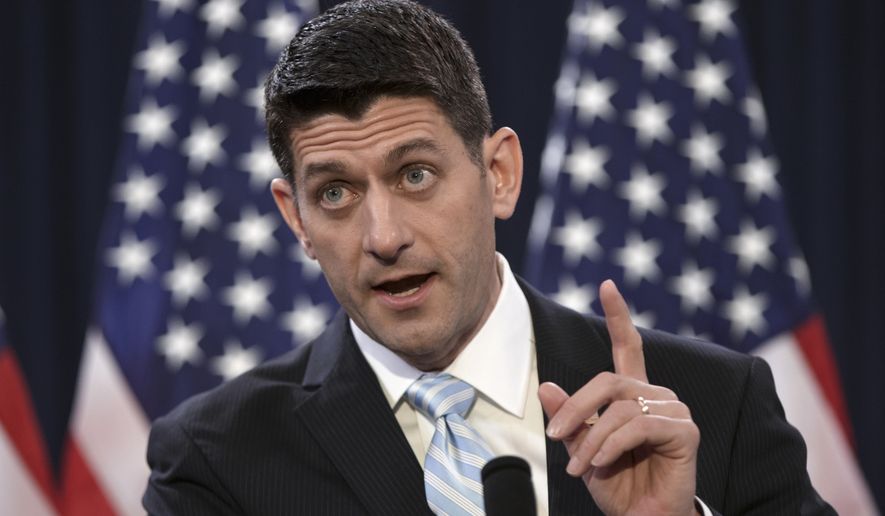A wealthy businessman with tea party ties confirmed Sunday that he is mounting a primary challenge to House Speaker Paul D. Ryan, saying that after donating to the Wisconsin Republican’s past campaigns he feels “betrayed” by the speaker on trade deals and immigration.
The businessman, who is not yet revealing his identity, promised that his run will “shake up the establishment in a profound way,” according to a political consultant close to the prospective candidate.
The emergence of a viable Republican challenger in Wisconsin’s 1st Congressional District is the culmination of a monthslong recruitment effort by tea party activists who say they were double-crossed by Mr. Ryan when he passed a $2 trillion spending package late last year.
Eric Odom, a conservative activist and political consultant in Wisconsin, confirmed with “100 percent certainty” that a local business leader would be running to oust Mr. Ryan.
“I’ve had the privilege of attending multiple meetings with this individual, during which he has expressed his sense of betrayal by Speaker Ryan. He has a strong desire to see real representation for the people of the district versus a congressman who represents special interests in Washington,” he said.
“It’s very personal for him,” Mr. Odom added. “He intends to run a full-scale candidacy that will shake up the establishment in a profound way.”
He acknowledged that it won’t be easy to defeat Mr. Ryan, who was the party’s 2012 vice presidential nominee, currently ranks as one of the most powerful Republicans in Washington and has more than $5 million in his campaign war chest.
The businessman is prepared to put a substantial amount of his personal fortune into the campaign, Mr. Odom said.
“He was pushed to the edge and betrayed,” he said.
While it’s often an uphill run, there is precedent for a tea party challenger toppling a member of the House Republican leadership. Eric Cantor, while serving as majority leader, lost his seat in a Richmond, Virginia, suburb in a 2014 primary upset to tea party-backed Dave Brat.
However, Mr. Ryan’s predecessor as speaker, John A. Boehner, easily defeated a tea party-backed primary challenger the same year in Ohio. At the time Mr. Boehner faced widespread opposition from conservatives and a revolt in the House Republican conference, which ultimately prompted him to resign in October.
Mr. Ryan did not seek the speakership but was drafted by conservative and mainstream House Republicans who saw him as a unifying figure who could mend the divide in the conference.
Still, the discontent on the homefront for Mr. Ryan is part of the ongoing tension between conservatives who want aggressive action to implement a right-wing agenda and party leaders who have taken a measured approach.
Mr. Ryan’s campaign team previously shrugged off talk of a primary challenge. A spokesman did not immediately respond to questions about confirmation that a viable candidate was getting into the race.
Mr. Ryan came under fire from conservatives shortly after he took the job of speaker in October and almost immediately pushed through the $2 trillion spending bill, which renewed popular tax breaks and increased the federal deficit by hundreds of billions of dollars.
The spending package avoided a government shutdown by striking a deal that surrendered on conservatives’ top priorities, including giving up the fights to defund Planned Parenthood and to block President Obama’s plan to bring at least 10,000 Syrian refugees to the U.S.
It also enraged advocates for a crackdown on illegal immigration by funding so-called sanctuary cities that provide safe harbor for illegal immigrants and failing to rein in Mr. Obama’s executive action to grant deportation amnesty.
Mr. Ryan defended the bill and his loyalty to the conservative cause.
“The members that asked me to become speaker, that elected me to speaker, know that I come from the conservative movement and that I’m a movement conservative with an eye on the prize, which is actually achieving success,” Mr. Ryan said in an NBC interview after passage of the spending bill.
“In divided government you don’t get everything you want,” he said. “So we fought for as much as we could get. We advanced our priorities and principles. Not every single one of them, but many of them.”
• S.A. Miller can be reached at smiller@washingtontimes.com.




Please read our comment policy before commenting.